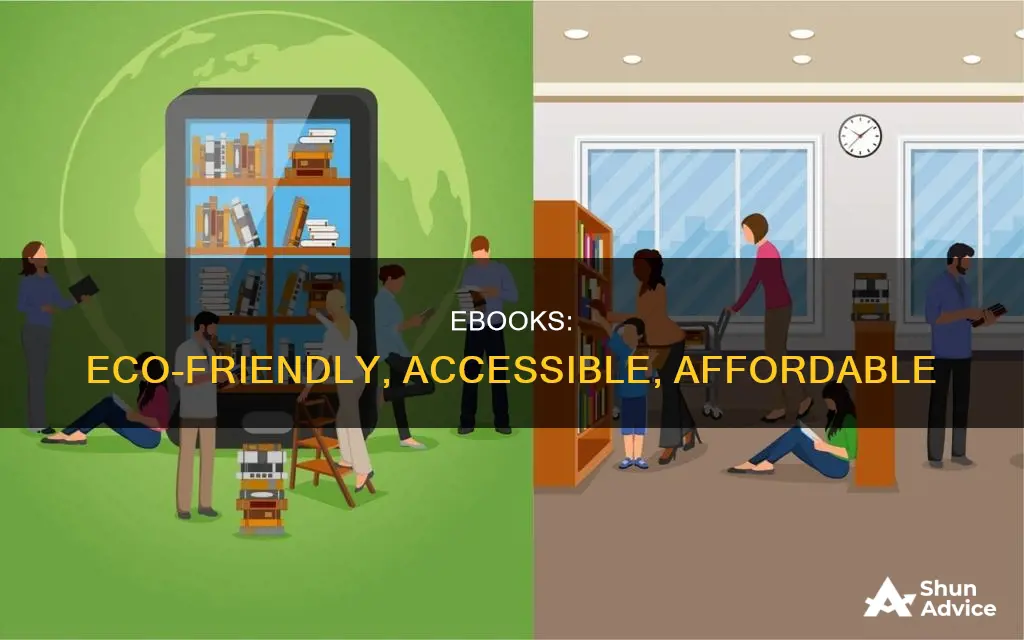
The debate between ebooks and printed books has been going on for years, with many people preferring the authenticity and feel of a physical book. However, ebooks have several advantages that make them a more attractive and convenient option for readers. Firstly, ebooks are highly portable, allowing readers to carry thousands of books on a single lightweight device. This makes them perfect for students who no longer need to carry heavy bags full of books. Ebooks are also easily accessible and can be downloaded within minutes, eliminating the need to go to a store or wait for delivery. They are also usually cheaper than physical books and can often be found for free or on sale. Additionally, ebooks offer fun features such as sharing highlighted quotations on social media, looking up words in the built-in dictionary, and adding digital bookmarks. Furthermore, ebooks are environmentally friendly as they eliminate the need for paper printing, saving millions of trees. While printed books have their own advantages, such as providing a more tactile and traditional reading experience, ebooks offer convenience, portability, and affordability, making them a great alternative for readers.
| Characteristics | Values |
|---|---|
| Portability | eBooks are lightweight and easy to carry. |
| Accessibility | eBooks can be downloaded and stored for later use. |
| Cost | eBooks are generally cheaper than physical books. |
| Availability | eBooks are never out of stock. |
| Interactivity | eBooks have interactive features such as bookmarks, highlights, and notes. |
| Sharing | eBooks can be shared with multiple users at once. |
| Customisation | eBooks allow users to change the font size, line spacing, and format. |
| Space | eBooks save physical space. |
| Convenience | eBooks can be purchased and downloaded in a matter of minutes. |
What You'll Learn
- Ebooks are more portable and lightweight, allowing readers to carry thousands of books on a single device
- Ebooks are easily accessible and downloadable, saving time and effort spent on travelling to bookstores or waiting for deliveries
- Ebooks are often cheaper than printed books, with many available for free or at discounted prices
- Ebooks offer customisation options like adjustable font size and style, making them more accessible for readers with visual impairments
- Ebooks are environmentally friendly as they eliminate the need for paper printing and transportation, reducing carbon footprint

Ebooks are more portable and lightweight, allowing readers to carry thousands of books on a single device
Ebooks are portable and lightweight, making them a convenient option for readers. Instead of carrying multiple heavy books, an e-reader can hold thousands of books, saving space at home and in your bag. This is especially beneficial for students who no longer have to carry a bag full of books every day.
The portability of ebooks also means that readers can carry their entire library with them wherever they go. This allows readers to access their books at any time and in any place, without having to worry about storage limits. The convenience of having a vast library on a single device is further enhanced by the fact that ebooks can be downloaded and stored for later use, even in the absence of an internet connection.
The lightweight and portable nature of ebooks also saves readers from having to carry around bulky hardcover books, making them a lighter and more travel-friendly option. This is especially useful for avid readers who are always on the go or who want to save space and reduce clutter.
Additionally, the portability of ebooks means that readers can easily access their books while travelling. Whether on a plane, train, or simply waiting for an appointment, readers can conveniently access their ebooks and continue their reading journey without having to worry about the weight or space constraints of printed books.
Theft of Investments: A Growing Concern
You may want to see also

Ebooks are easily accessible and downloadable, saving time and effort spent on travelling to bookstores or waiting for deliveries
Ebooks are also more portable than physical books, so you can carry dozens, if not hundreds or thousands, of them on a device that weighs less than half a pound. This makes them ideal for students who no longer have to carry a bag full of heavy books every day. They are also convenient for people who are always on the go or who travel a lot.
Ebooks can be downloaded from a variety of sources, including Amazon, Kobo, Barnes & Noble's Nook Store, Apple's Books Store, and the Google Play Book Store. You can also access ebooks through subscription apps such as Scribd and Kindle Unlimited. Additionally, many ebooks are available for free through local libraries and other avenues, such as Project Gutenberg.
What Your Neighbors Are Investing In
You may want to see also

Ebooks are often cheaper than printed books, with many available for free or at discounted prices
In the past, digital versions of books were priced much lower than their physical counterparts. While this price gap has narrowed over time, ebooks are still often more affordable, especially for older works, backlist titles, and books from independent authors. You can find many ebooks priced between $1 and $5, and classic literature is often available for free.
Subscription services like Kindle Unlimited or Audible offer another cost-effective way to access a vast library of ebooks. While you won't own the books, these services can significantly reduce the per-book cost for avid readers. Additionally, public libraries often provide free access to ebooks, allowing you to borrow them for a select period.
The initial investment in an e-reader may be higher than the cost of a single printed book, but the long-term savings from purchasing lower-priced ebooks can make it a financially smart choice.
Stock Market: Invest Now or Later?
You may want to see also

Ebooks offer customisation options like adjustable font size and style, making them more accessible for readers with visual impairments
Ebooks offer a range of customisation options that make them more accessible to readers with visual impairments. One of the key advantages of ebooks is the ability to adjust the font size and style, making them more readable for those with impaired vision. This feature also benefits readers without visual impairments, as they can adjust the font to their personal preference.
The flexibility of ebooks extends beyond font customisation. Users can also adjust the line spacing and format orientation to suit their needs. Some ebooks even allow readers to change the font colour, providing an even greater level of personalisation. These adjustable features enhance the reading experience for a diverse range of users, ensuring that ebooks are not only accessible but also comfortable and enjoyable for all.
The customisability of ebooks is particularly beneficial for readers with visual impairments or dyslexia, as well as those who require larger text or a specific format for easier reading. By magnifying the font and adjusting the layout, readers with visual challenges can comfortably engage with the content. This adaptability is a significant advantage of ebooks over printed books, which have a fixed layout that cannot be altered to meet individual needs.
In addition to customisation options, ebooks often include a built-in dictionary, enabling readers to quickly look up unfamiliar words without interrupting their reading flow. This feature can be especially useful for readers with visual impairments, eliminating the need to search for a physical dictionary or rely on other sources for definitions.
The digital nature of ebooks also allows for seamless integration with audio features. Many ebooks are now equipped with a "read-aloud" function, which can assist readers with visual impairments or learning difficulties. This functionality transforms the written content into an auditory experience, making information more accessible to a wider range of users.
Investing Strategies During Economic Downturn
You may want to see also

Ebooks are environmentally friendly as they eliminate the need for paper printing and transportation, reducing carbon footprint
Ebooks are a more environmentally friendly option than printed books. By choosing to invest in an ebook instead of a printed book, you can help reduce your carbon footprint.
Firstly, ebooks eliminate the need for paper printing. The production of paper books requires the cutting down of trees, with around 2.2 million books published each year using around 3 million trees. This not only contributes to deforestation but also adds to the carbon footprint through the transportation of raw materials, the production process in mills, and the final shipping of the books. Ebooks, on the other hand, do not require any paper printing or transportation, significantly reducing their environmental impact.
Additionally, ebooks offer a more sustainable alternative to printed books by reducing the need for physical storage. With ebooks, you can store thousands of books on a single device, eliminating the need for physical bookshelves or storage spaces. This not only saves space in your home but also reduces the carbon emissions associated with the production and transportation of storage furniture.
Furthermore, ebooks provide an eco-friendly solution to the issue of waste disposal. Printed books have a finite lifespan and eventually end up in landfills, contributing to waste accumulation. Ebooks, on the other hand, are digital files that do not produce any physical waste.
While it is important to consider the carbon emissions associated with the production of e-readers, the environmental benefits of ebooks become more significant for avid readers. If you are a frequent reader, the reduced need for paper printing, storage, and waste disposal can lead to a substantial decrease in your overall carbon footprint.
By choosing ebooks over printed books, you can play a part in preserving our planet's resources, reducing waste, and lowering your carbon emissions.
Food Startups: Invest in Your People
You may want to see also
Frequently asked questions
E-books are lightweight and easy to carry, allowing you to access thousands of books on a single device. They are also easily accessible and can be downloaded within minutes. E-books are often cheaper than physical books, and many classics are available for free. Additionally, e-books offer features such as adjustable font size and screen brightness, built-in dictionaries, and text-to-speech capabilities.
E-books eliminate the need for paper printing and reduce carbon emissions associated with transporting raw materials and shipping finished books. However, the environmental impact of e-books vs. printed books depends on your reading habits. E-readers consume more carbon to produce, so they are only more environmentally friendly if you are an avid reader.
Some readers may find the features of e-books difficult to use, especially those who are less tech-savvy or older. E-books may also cause eye strain during prolonged reading sessions, and they require charging, which can be inconvenient when travelling. Additionally, sharing e-books with family and friends may be more difficult due to usage restrictions.







